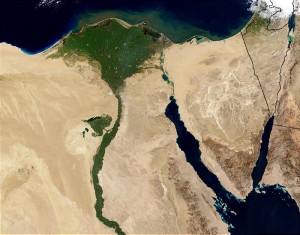
(Wikimedia Commons/Jacques Descloitres)
Environmental experts have predicted that 30% of the Nile Delta will be submerged under water by 2030 because of the rise in land temperatures due to climate change. They added that this may threaten agriculture in Egypt.
This is also largely due to the even more rapid urbanisation witnessed as a result of the lack of security after the revolution, said Head of the Environmental Committee at the Egyptian Businessmen’s Association (EBA) Ali El-Koraiey, according to MENA.
The predictions came during a conference, ‘The Future of Egypt’s Water and Investments in Nile Basin Countries’, organised by the Environmental Committee at the EBA.
Climate change and the rise of Mediterranean Sea water levels due to global warming are major challenges facing Egypt in the coming era, said the experts.
“The increase of salts in underground water is a crisis and real challenge,” said El-Koraiey. “Moreover, it also threatens agricultural land”.
Former Minister of Irrigation and Water Resources Mahmoud Abo Zied said that 14% of Egypt’s water is currently allocated to the agricultural sector, while industry consumes 30%, with 56% used for other services.
“Egypt is below the water poverty line with an average of 650 cubic metres per person,” he said. “The normal standard is 1,000 cubic metres per person.”
“The Earth’s temperature is going to rise, over the next 30 years, by 4.5 to 5 degrees Celsius,” he continued.
“It’s a global crisis not just an Egyptian one,” Reem Labib, an environmental expert at the Egyptian Initiative for Personal Rights (EIPR), told daily news Egypt.
She added that climate change and “climate justice” are indeed pressing issues that need much more attention in Egypt.
“The reasons for climate changes are many,” she said. “They include burning fuel, methane gas and other environmental reasons.”
“The Nile Delta is the area most threatened by this phenomenon because of its closeness to the sea and its low land levels,” said Labib.
Climate change, the phenomenon the world was first introduced to during a Conference on the Environment in Stockholm in 1972, is expected to eventually lead to the submersion of low-lying coastal areas and river deltas, as well as a decrease in some food crops such as rice and wheat, increased rates of desertification and drought, melting ice caps and snowy mountains and the disappearance of some species of living organisms.
According to studies by Geologist Abdel Qader Ouda, this phenomenon has been affecting Egypt for a long time.
Four years ago the Minister of Environment and advisor for climate change affairs at the time, Sayed Sabry, said that Egypt faced the danger of climate change. “There are scenarios where there is an 11% probability that the entire area of the Nile Delta will sink, a situation that requires coordination between various bodies,” said Sabry.
According to news agencies, the Coastal Research Institute has now ended the preparation of an environmental study to protect the shores of the Nile along the Delta by setting up sand barriers to protect them from such risks.






